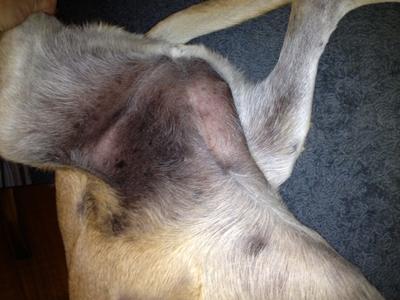
Holly’s belly
My dog’s skin and belly used to be a light pink. In the last couple of years it has started to turn black and splotchy – I took her to the vet and they did not have much to say other than unless she is itching not to worry about it too much and to use Vet Solutions Sebozole Shampoo (Miconzole Nitrate 2% and Chloroxylenol 1%).
Holly is an 8 year old spayed ridgeback/shepherd mix.
The vet’s recommendation seemed to work well for a while and the skin would turn back to pink. But Holly started to lick and bite herself repeatedly in different areas on her behind and the back of her legs – the hair would fall out and the area would turn red. I used Sebozole on those areas, and again, it seemed to help momentarily. But this is a reoccurring issue and am hoping to get to the root of the problem.
In the last several weeks my 6 year old Australia Shepherd mix Willow began showing similar symptoms. The skin on the inside of her legs is turning black and there are dark spots on her pink belly where there were none before.
Do you believe in holistic pet care? If so, please tell your friends about us. Thank you for supporting our efforts!




